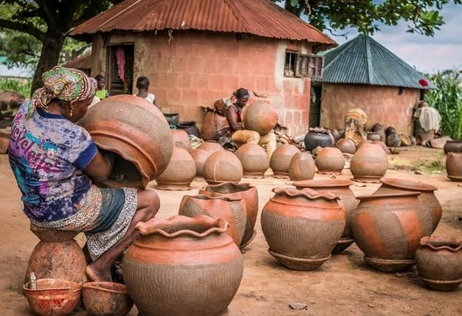
support@yorubalibrary.com
+2348073529208, 07038599574

Yoruba traditional pottery is a significant aspect of the Yoruba culture, reflecting the community's artistic heritage and utilitarian craftsmanship. Pottery has been used for centuries in various aspects of daily life, from cooking to rituals. This article explores the techniques and designs that define Yoruba traditional pottery.
Historical Background
Pottery in Yoruba culture dates back to ancient times, serving both practical and ceremonial purposes. Yoruba potters, often women, are skilled artisans who pass down their techniques through generations. The knowledge and skills involved in pottery making are deeply rooted in the cultural and spiritual practices of the Yoruba people.
Pottery Techniques
Clay Selection
The process begins with the selection of the right type of clay. Yoruba potters typically source clay from local deposits, ensuring it is free from impurities. The quality of the clay is crucial as it affects the durability and finish of the pottery.
Clay Preparation
Once collected, the clay is prepared by kneading and pounding to remove air bubbles and achieve a consistent texture. This step is essential to prevent cracks and ensure the clay is pliable enough for shaping.
Hand Building
Yoruba traditional pottery is predominantly hand-built using techniques such as coiling and pinching. Coiling involves rolling the clay into long, snake-like strips, which are then stacked and smoothed to form the walls of the pot. Pinching involves shaping the clay directly with fingers to create smaller items like bowls and cups.
Moulding
In some cases, potters use molds to achieve specific shapes and designs. Molds are typically made from materials like wood or clay and are used to create uniformity in the pottery pieces.
Decoration
Decoration is an integral part of Yoruba pottery. Potters use various methods to adorn their creations, including incising, impressing, and painting. Incising involves carving patterns into the clay, while impressing uses objects to stamp designs onto the surface. Traditional pigments, often derived from natural sources, are used for painting.
Firing
The final step in the pottery-making process is firing. Yoruba potters traditionally use open fires or simple kilns to harden the clay. The firing process requires careful control of temperature to ensure the pottery is strong and durable.
Pottery Designs
Geometric Patterns
Geometric patterns are a common feature in Yoruba pottery. These designs often include lines, triangles, circles, and other shapes, creating intricate and visually appealing motifs. Geometric patterns hold symbolic meanings, representing concepts such as unity, balance, and continuity.
Natural Motifs
Nature-inspired motifs are also prevalent in Yoruba pottery. These designs depict elements such as leaves, flowers, animals, and water. Natural motifs reflect the Yoruba people's connection to their environment and their appreciation for the beauty of nature.
Symbolic Imagery
Symbolic imagery in Yoruba pottery often conveys spiritual and cultural messages. Designs may include symbols representing deities, ancestral spirits, and cultural beliefs. These symbols serve not only as decoration but also as a means of communication and storytelling.
Cultural Significance
Utilitarian Role
Yoruba pottery plays a vital role in everyday life. Pots are used for cooking, storing food and water, and serving meals. The durability and practicality of these items make them indispensable household tools.
Ritualistic Use
Pottery is also significant in Yoruba rituals and ceremonies. Specially crafted pots are used in religious practices, offerings, and traditional rites. These ritualistic pots are often elaborately decorated to reflect their sacred purpose.
Artistic Expression
Pottery is a form of artistic expression in Yoruba culture. The creativity and skill involved in making and decorating pots showcase the artistic talents of Yoruba potters. Each piece is unique, reflecting the individuality and craftsmanship of the potter.
Modern Adaptations
Contemporary Pottery
Yoruba pottery has adapted to modern times while retaining its traditional essence. Contemporary potters experiment with new techniques and materials, creating innovative designs that appeal to both local and international markets.
Cultural Preservation
Efforts to preserve Yoruba traditional pottery are ongoing. Cultural organizations and artisans work together to teach younger generations the traditional techniques and significance of pottery, ensuring the continuation of this cultural heritage.
Conclusion
Yoruba traditional pottery is a testament to the skill, creativity, and cultural richness of the Yoruba people. The techniques and designs that define Yoruba pottery have been passed down through generations, maintaining their relevance and beauty. Whether used for practical purposes or artistic expression, Yoruba pottery remains an integral part of Yoruba cultural heritage.

Learn about the Yoruba concept of Ìwà Pẹ̀lẹ́ (good…

Learn special praises for Divine Being and Creator…